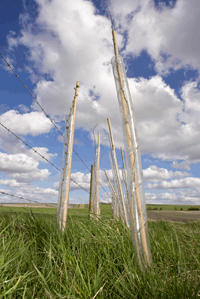Now Scots face compulsory set-aside replacement

Conservationists have called for a compulsory set-aside replacement in Scotland – just weeks after DEFRA ruled out similar measures for England.
Scottish farmers who receive support payments should be made to implement additional environmental measures to provide winter feed and wildlife habitats for farmland birds, said the RSPB.
Corn-bunting numbers have declined by 83% over the past 20 years, reveals a new study. The birds have disappeared from all but four of 30 areas of Scottish farmland monitored by researchers.
Changed cropping and intensive production methods mean as few as 800 corn-bunting territories now remain in Scotland, reveal findings published in Bird Study, the journal of the British Trust for Ornithology.
RSPB farmland birds officer Hywel Maggs said: “A special project aimed at the farms where corn buntings still breed is essential, but we need an urgent replacement for the set-aside scheme, delivering equivalent benefits in well-targeted areas.
“Ultimately, in addition to targeted agri-environment schemes, additional compulsory measures in cross-compliance will be necessary to ensure a full range of public benefits are delivered by the public subsidies paid to farmers.”
The recommendation is at odds with the situation in England where the government decided earlier this month that a voluntary rather than compulsory approach was the best way of encouraging farmers to boost farmland bird numbers.
Study leader Adam Watson said he was “saddened and worried” by his own findings. He added: “The government must urgently extend the targeted initiatives which have reversed declines on some farms.”
A 2002 scheme encouraged farmers to halt corn-bunting declines by a mowing grass meadows later, reducing pesticide use and providing winter seed food. But the initiative was overhauled in 2006, resulting in a lack of funding.
The end of set-aside, which was effectively abolished in 2007, could only spell further trouble for the bird, the RSPB warned. Scottish Natural Heritage has also called for more encouragement for producers to provide farmland bird habitats.
